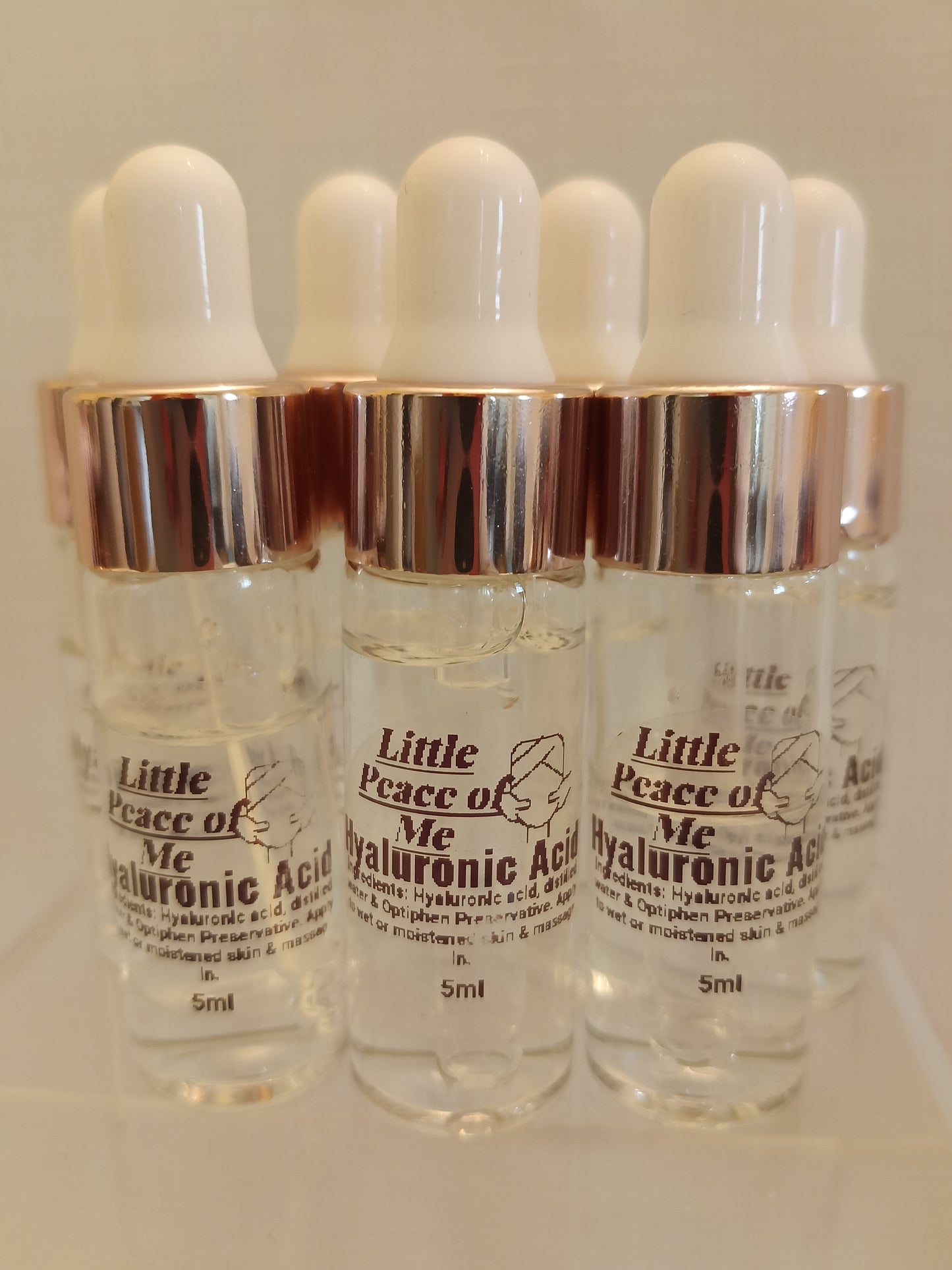Little Peace of Me
Hyalronic Acid 5ml.
Hyalronic Acid 5ml.
Couldn't load pickup availability
What is hyaluronic acid?
Hyaluronic (pronounced hi-ah-lew-ron-ic) acid — also known as hyaluronan or hyaluronate — is a gooey, slippery substance that your body produces naturally. Scientists have found hyaluronic acid throughout the body, especially in eyes, joints and skin.
What does hyaluronic acid do for you?
Hyaluronic acid is a remarkable substance because of all the benefits and uses it has in your body. Here are just a few of the benefits of hyaluronic acid:
- It helps things move smoothly. Hyaluronic acid helps your joints work like a well-oiled machine. It prevents pain and injury from bones grinding against each other.
- It helps keep things hydrated. Hyaluronic acid is very good at retaining water. A quarter-teaspoon of hyaluronic acid holds about one and a half gallons of water. That’s why hyaluronic acid is often used for treating dry eyes. It’s also used in moisturizing creams, lotions, ointments and serums.
- It makes your skin flexible. Hyaluronic acid helps skin stretch and flex and reduces skin wrinkles and lines. Hyaluronic acid is also proven to help wounds heal faster and can reduce scarring.
How is it made?
Hyaluronic acid is often produced by fermenting certain types of bacteria. Rooster combs (the red, Mohawk-like growth on top of a rooster’s head and face) are also a common source.
Is hyaluronic acid safe?
Yes. Research shows that hyaluronic acid is safe to use. Reactions or adverse effects from hyaluronic acid are rare, and it’s safe to use if you’re pregnant or nursing.
How does hyaluronic acid interact with other products?
Products that combine hyaluronic acid with other medications or compounds may have some risks of side effects.
It’s important to tell your healthcare provider about all medications that you’re taking, including supplements, vitamins, etc. They can help you better understand any potential concerns.
How can I take hyaluronic acid?
There are many ways you can take hyaluronic acid (either on its own or in combination products). Many are available over-the-counter. Some need a doctor’s prescription. For some, you need to see a trained medical professional.
A few of the different ways (available over-the-counter) that you can take hyaluronic acid include:
-
By mouth: Hyaluronic acid comes in dietary supplements and pills. There’s even a liquid form that you can mix with water and drink.
- Taking hyaluronic acid by mouth can have many benefits. These include reducing arthritis pain, improving skin health and more.
-
On your skin: Hyaluronic acid products come in various forms that you put on your skin. These include shampoos, lotions, creams, gels, ointments, patches and serums. You can also buy hyaluronic acid powder and mix it with water to create a hyaluronic acid serum you can apply to your skin.
- Hyaluronic acid has beneficial properties when used on your skin. It’s especially useful for reducing the appearance of wrinkles and age lines.
- For intimate contact: Hyaluronic acid is a common ingredient in gels, creams or personal lubricants for vaginal dryness or pain, especially for women experiencing menopause.
Is hyaluronic acid good for acne?
Hyaluronic acid is widely used as an ingredient in fillers that repair or conceal scars left behind by acne. There has been some limited research into combinations of hyaluronic acid and other medications to treat acne, but so far, there isn’t much evidence that these are effective.
Is hyaluronic acid safe?
Yes, depending on how it’s used. Over-the-counter hyaluronic acid serums and products applied on your skin (creams, lotions, etc.) or in eye care products are considered safe. Hyaluronic acid supplements taken by mouth are also considered safe (but you should still tell your healthcare provider about them, as you would for any other medication, vitamin or supplement).
Prescription hyaluronic acid products should be taken exactly as instructed by your healthcare provider. Injections of any kind containing hyaluronic acid should only be given by a licensed, qualified medical professional.
When should I talk to my healthcare provider about hyaluronic acid?
You may want to talk to your healthcare provider about hyaluronic acid if you’re interested in using it as a supplement. You may also want to also ask them about treatment options that use hyaluronic acid for the following conditions or purposes:
- Skin health (especially dryness, scarring, stiffness and skin diseases like scleroderma and actinic keratosis).
- Eye health, especially for treating dry eyes.
- Joint health, especially for treating arthritis and soft tissue injuries.
- For wounds that are slow to heal.
- As a treatment option for bladder pain, especially pain caused by interstitial cystitis.
- Respiratory conditions like asthma.
Share







